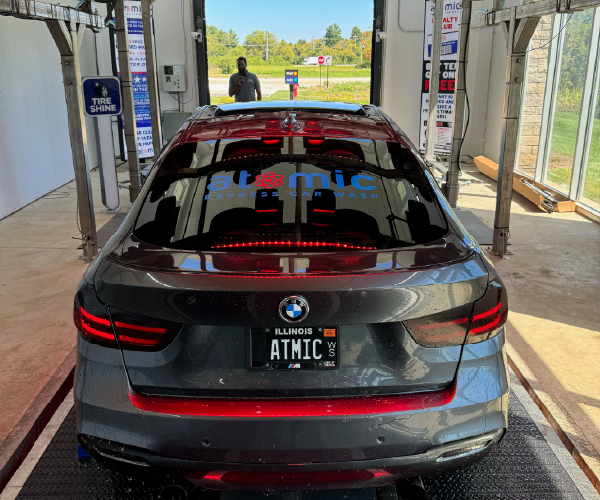
Washing Your Car in France
October 1, 2012
4 minute ReadAnyone who has ever spent time in Paris (one of the world’s most visited cities) knows the French are sticklers for quality. After all, this is the country responsible for champagne, the Tour-de-France, and the Eiffel Tower — one of the most celebrated architectural structures of the modern world. It’s no wonder that the French would apply this same quality-conscious approach to washing their cars — even if they don’t wash them as frequently as U.S. counterparts
According to Michael von Knorring, sales manager for carwash manufacturer Washworld in Europe, French consumers, as well as those throughout Europe, “are expecting a real high quality wash and dry. For example, European carwash machines have a contour drying system that follows the car’s shape, giving a better dry than some of the U.S. machines.”
Despite this emphasis on quality, the average French customer only brings his or her vehicle into a commercial carwash 7 times per year, according to von Knorring. This is at least partially due to cost: a visit to the French carwash runs 7-12€, which equals approximately $9-$15.50, and gas can cost the equivalent of $7 a gallon.
An Industry Overview
France has no carwash trade association, so it is difficult to know exactly how many carwashes there are in France. However, Sandrine Letendard, a marketing executive at Lavance, one of France’s leading carwash suppliers, estimates that there are roughly 12,000 locations (including those for industrial vehicles). This is relatively small compared to neighboring Germany, which boasts just over 18,000 locations and tiny compared to America’s 80,500 locations. As a company, though, Lavance — which has around 3,000 customers — is claiming a sizable portion of the market for itself and growing by approximately 10 new locations every week.
While Lavance may be going strong, von Knorring points out sales of new carwash locations across France are down
45 percent due to the recession. In fact, the whole French industry seems to be in flux. Gas stations once had over 60 percent of the market. Today, though, the number of gas stations across France is shrinking “as the major oil companies are divesting their retail business and moving into the core business of refineries,” von Knorring explains. Now, the market share held by these oil companies has shrunk to 40 percent while the number of super hypermarkets, financed by private investors, has risen to 60 percent.
Though size may be one difference between France’s market and the United Sates’s, the type of car washes used is also different. In the U.S., there are nearly an equal number of roll-overs, tunnels, and self-serve carwashes. In France, however, roll-over and self-service carwashes are much more popular than tunnels. For instance, there are about 7000 gas stations with both roll-overs and self-service, but tunnels remain a niche market. According to von Knorring, the French industry has been this way for decades: “Automatic rollovers took over in the 1970s with combination machines, and self service stations developed very strongly in 1980-90.” Nonetheless, Sandrine Letendard and von Knorring both agree that the demand for tunnels in France is growing, which suggests a lucrative trend on the industry’s horizon.
France Goes a Little Greener
Throughout Europe, water conservation is almost a way of life for French individuals, as well as business owners. In fact, many countries, such as Germany, actually have laws limiting water consumption commercially and domestically.
The green movement has long inspired carwash suppliers in most of Europe to create and distribute the highest quality eco-conscious products. Thomas Roth, the Director of Marketing for WashTec (which is headquartered in Germany and a leading supplier to the French industry) has said, “We feel that we have a duty to uphold the principle of ecological sustainability, which is why we strive to use resources as efficiently as possible. By developing eco-friendly products, we actively help to preserve the world’s limited reserves of energy and raw material resources.”
Given this passion for the environment, it’s not surprising that, according to von Knorring, EU standards for carwashes will make water reclaim systems required in 2014. This new regulation will make eco-friendlines mandatory in France, where the trend for green carwash products and services has not been as popular as in other European countries. For instance, Lavance distributes equipment that “recycles up to 80 percent of the water, but these are not really in demand in France since there has been no law compelling carwashes to recycle water,” Letendard explains.
Now that eco-conscious regulations are just around the corner for the French carwash industry, perhaps other green products and services will grow in popularity. For instance, Lavance has come up with an innovative way to cut costs and reduce their carbon footprint: the company provides an electronic service that monitors carwash locations, ensuring they are operating just as they should. If a piece of equipment stops working, the Lavance hotline is notified and a technician makes a service call to the carwash owner, talking him or her through the process of restarting the equipment. Letendard says, “This application has enabled us to avoid 80 percent of the trips technicians used to make.”
French consumers may not make it to the carwash as often as Americans, or even their German neighbors, but once there, they do want the best the industry has to offer. For example, French customers are content to wait longer if it means they’ll be cruising the streets in a gleaming, streak-free vehicle. What’s next for an industry with such an unrelenting focus on quality? Will the niche market for tunnels blossom? Will suppliers perfect their green products and services? There’s no telling what heights this high-minded market will reach.








